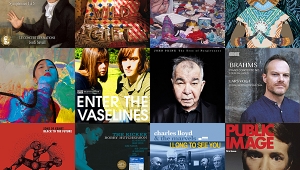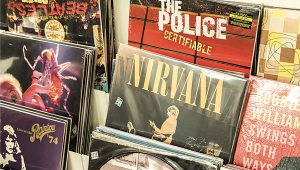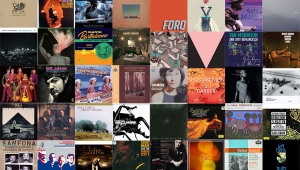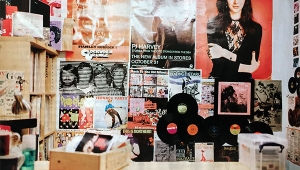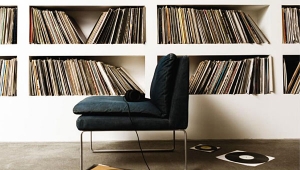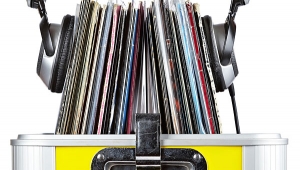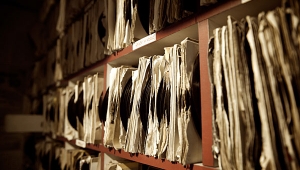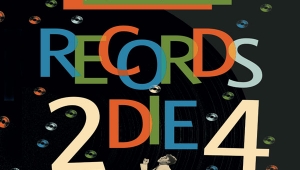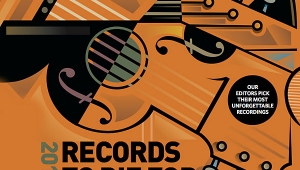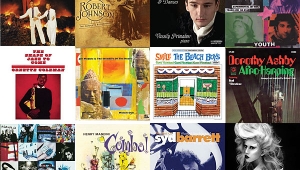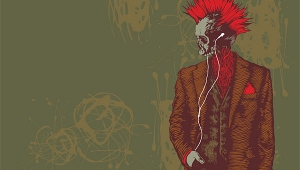| Columns Retired Columns & Blogs |
2002 Records To Die For Page 2
John Atkinson
BILLY JOEL: Fantasies & Delusions, Opp.1-10 for Solo Piano
Richard Joo, piano
Sony Classical CK 85397 (CD). 2001. Steven Epstein, prod., mastering; Don Devito, assoc. prod.; Richard King, eng., mastering. DDD. TT: 76:18
Recordist David Smith, who's been in charge of engineering for Sony Classical for many years, once told me that the key to a successful piano recording is to capture enough of the room ambience to allow the instrument to be placed within a facsimile of the space but not so much or of the wrong kind, that the overall sound becomes "cold" and unsupportive of the music. This CD of classical piano works from a somewhat surprising source succeeds in those terms. Richard Joo's performances on a harmonically complex Steinway D in the Konzerthaus of Vienna's Mozartsaal sounds warm and rich, yet believably dynamic and detailed. The music is unashamedly tonal, Chopinesque and Schumannesque, with occasional tinges of early Liszt, but none the worse for that. Billy Joel's apparently infinite gift for creating memorable melodies pulls the listener through any initial doubts he may have had about the correctness of the concept. The highlight for me is Op.1, Soliloquy (On a Separation), a rondo in which contemplative passages are punctuated by a sweepingly passionate theme. I am only sorry that I could not persuade music editor Robert Baird to make this CD Stereophile's "Recording of the Month" last December.
EBERHARD WEBER: Endless Days
Eberhard Weber, upright electric bass; Paul McCandless, oboe, English horn, bass clarinet, soprano sax; Rainer Brüninghaus, piano, keyboards; Michael Di Pasqua, drums, percussion
ECM 1748 (CD). 2001. Manfred Eicher, prod.; Jan Erik Kongshaug, eng. DDD. TT: 48:03
In general, when I see the words "crossover" or "third stream" used to describe a recording, I turn the page. But after reading Tom Conrad's enthusiastic and insightful review (in last June's Stereophile) of Endless Days, bassist Eberhard Weber's first album as a bandleader in seven years, I had to get hold of the CD. I was glad I did.
AFGHAN WHIGS: Congregation
Sub Pop SP130b (CD). 1993. Ross Ian Stein, prod., eng.; Greg Dulli, prod.; Larry Brewer, asst. eng. AAD? TT: 44:46
Among the handful of truly essential records in the Sub Pop catalog, this 1992 masterwork may well be #1. The Whigs' last indie record before their sojourn at major label Elektra, this careening, churning, preening mass of uneasy self-loathing and self-absorption, spewed out by that once and perhaps future rock star Greg Dulli, is also one of the last great rock records.
RODNEY CROWELL: Ain't Living Long Like This
Warner Bros. BSK 3228 (LP). 1978. Brian Ahearn, prod., eng.; Bradley Hartman, Donivan Cowart, Bruce Brown, Geoff Sykes, Pat McDonald, engs. AAA. TT:
It's hard to overestimate the influence this album had on Rodney Crowell's career and the subgenre of country rock, of which Ain't Living Long Like This is one of the early masterpieces. Suddenly Crowell was recognized as one of Nashville's brightest young songwriting talents, and soon he was producing albums for the likes of Jim Lauderdale, Guy Clark, his then wife Rosanne Cash, and his father-in-law, the man in black himself.
JOAN BAEZ: Very Early Joan
Vanguard VSD 79446/7 (2 LPs). year?. Maynard Solomon, prod.; Marc Aubort, eng. AAA. THE PENTANGLE: Solomon's Seal
Reprise MS 2100 (LP). 1972. Pentangle, prods.; John Wood, prod., eng. AAA. TT: 36:00
No record is worth dying for. In fact, I'm convinced there is altogether too much "dying for" going on these days. So I skipped all the usual soul-searching over this year's choices and replaced it with a simple question: Just what did I want to hear right now? I apologize for the nostalgic nature of my two picks, but even jaded reviewers are entitled to a touch of longing now and then.
JOHN COLTRANE: Live at the Village Vanguard Again!
John Coltrane, soprano & tenor sax; Pharoah Sanders, sax; Alice Coltrane, piano; Jimmy Garrison, bass; Rashied Ali, drums Impulse! 213 (CD). 1966. Bob Thiele, prod.; Rudy Van Gelder, eng. AAD. TT: 40:55
As secure as his place in the jazz pantheon may be, John Coltrane's "late period," like Miles Davis', has yet to be fully accepted by critics or fans. This live session, one of the last of Trane's recordings to be released before his death in 1967, captures the agonized ecstasies of his final band.
THE MONTUÑO SESSIONS: Live from Studio "A"
Various Artists
Mr. Bongo 004 (CD). 1995. Al Angeloro, prod., eng. AAD. TT: 71:56
In the late 1980s, New York disc jockey Al Anglero presented a series of live Latin jam sessions on his Saturday-night radio program. Culled from tapes of those shows, this disc finds the Afro-Cuban heart of salsa throbbing hard in the Big Apple at a time when new Cuban recordings were still unavailable in the US. With commercial salsa in the doldrums, lesser-known and under-appreciated artists like Wayne Gorbea and Charlie Palmieri looked back to their roots and laid down some timeless grooves.
BILLY JOEL: Fantasies & Delusions, Opp.1-10 for Solo Piano
Richard Joo, piano
Sony Classical CK 85397 (CD). 2001. Steven Epstein, prod., mastering; Don Devito, assoc. prod.; Richard King, eng., mastering. DDD. TT: 76:18
Recordist David Smith, who's been in charge of engineering for Sony Classical for many years, once told me that the key to a successful piano recording is to capture enough of the room ambience to allow the instrument to be placed within a facsimile of the space but not so much or of the wrong kind, that the overall sound becomes "cold" and unsupportive of the music. This CD of classical piano works from a somewhat surprising source succeeds in those terms. Richard Joo's performances on a harmonically complex Steinway D in the Konzerthaus of Vienna's Mozartsaal sounds warm and rich, yet believably dynamic and detailed. The music is unashamedly tonal, Chopinesque and Schumannesque, with occasional tinges of early Liszt, but none the worse for that. Billy Joel's apparently infinite gift for creating memorable melodies pulls the listener through any initial doubts he may have had about the correctness of the concept. The highlight for me is Op.1, Soliloquy (On a Separation), a rondo in which contemplative passages are punctuated by a sweepingly passionate theme. I am only sorry that I could not persuade music editor Robert Baird to make this CD Stereophile's "Recording of the Month" last December.
EBERHARD WEBER: Endless Days
Eberhard Weber, upright electric bass; Paul McCandless, oboe, English horn, bass clarinet, soprano sax; Rainer Brüninghaus, piano, keyboards; Michael Di Pasqua, drums, percussion
ECM 1748 (CD). 2001. Manfred Eicher, prod.; Jan Erik Kongshaug, eng. DDD. TT: 48:03
In general, when I see the words "crossover" or "third stream" used to describe a recording, I turn the page. But after reading Tom Conrad's enthusiastic and insightful review (in last June's Stereophile) of Endless Days, bassist Eberhard Weber's first album as a bandleader in seven years, I had to get hold of the CD. I was glad I did.
The eight tone paintings on Endless Days cover a wide range of compositional styles, from the improvisational solo bass excursions of Solo for Bass and A Walk in the Garrigue to the rhapsodic and occasionally minimalist scores for bass, drums, keyboards, and woodwinds like Concerto for Bass, Nuit Blanche, and the Mark Isham-colored title track. The music isn't jazz, even though there is some superbly inventive improvising, and it isn't classical, despite its formal scoring. But wherever you find this disc categorized in the CD store, all the compositions are underpinned by Weber's virtuosic playing on an amplified fretless standup bass that speaks with a clear voice in its top octaves but is still full and rich, without boom, in its lowest register.
The Norwegian recording is of necessity close-miked and multitracked, but intelligently done, with musical sensitivity. Yes, Tom Conrad remarked that engineer Jan Erik Kongshaug didn't capture "the last measure of air and intimacy that he gets with all-acoustic ensembles," but the soundscapes on this CD still envelop the listener in a satisfyingly hypnotic manner.
As a footnote, let me pay tribute to ECM's Manfred Eicher, a man who seems to be unaware of the ill winds blowing through the music industry, and who continues to issue a stream of jazz and classical recordings with both technical and musical merit. (XXIV-6)
![]()
Robert Baird
AFGHAN WHIGS: Congregation
Sub Pop SP130b (CD). 1993. Ross Ian Stein, prod., eng.; Greg Dulli, prod.; Larry Brewer, asst. eng. AAD? TT: 44:46
Among the handful of truly essential records in the Sub Pop catalog, this 1992 masterwork may well be #1. The Whigs' last indie record before their sojourn at major label Elektra, this careening, churning, preening mass of uneasy self-loathing and self-absorption, spewed out by that once and perhaps future rock star Greg Dulli, is also one of the last great rock records.
One listen to pretty-boy cad Dulli screeching "I'm gonna turn on you before you turn on me" ("Conjure Me") and you suddenly remember what Steven Tyler was like in 1972—damned annoying and raw, but genuinely possessed and believable. A searing cover of "The Temple," from Rice-Webber's Jesus Christ Superstar, has been known to provoke spontaneous combustion. Short on melodies and long on smashmouth rock energy, this most enduring artifact of Cincinnati rockophilia smokes nearly everything coming out of Seattle at the time. The burn that leaps out of Congregation's grooves became a conflagration when played live. Anyone who ever saw the Whigs has a pretty fair idea of what Dorothy went through when that Kansas farmhouse began to twitch and the tornado engulfed her.
RODNEY CROWELL: Ain't Living Long Like This
Warner Bros. BSK 3228 (LP). 1978. Brian Ahearn, prod., eng.; Bradley Hartman, Donivan Cowart, Bruce Brown, Geoff Sykes, Pat McDonald, engs. AAA. TT:
It's hard to overestimate the influence this album had on Rodney Crowell's career and the subgenre of country rock, of which Ain't Living Long Like This is one of the early masterpieces. Suddenly Crowell was recognized as one of Nashville's brightest young songwriting talents, and soon he was producing albums for the likes of Jim Lauderdale, Guy Clark, his then wife Rosanne Cash, and his father-in-law, the man in black himself.
The musicians involved are reason enough to perish for this record. Check out the list of guitarists: Albert Lee, James Burton, Amos Garrett, Ry Cooder. Whew! No talent there. Add to that Jim Keltner, Hal Blaine, and John Ware on drums, Glen D. Hardin and Mac Rebennack on piano, Byron Berline and Ricky Skaggs on fiddles, Hank Devito on pedal steel, Mickey Raphael on harmonica, and a clutch of vocalists—including Nicolette Larson, Willie Nelson, and Emmylou Harris—and you basically have the guts of both Elvis' band and Harris' Hot Band, as well as nearly every great county-rock player of the mid-Seventies.
Then there are the tunes. Like a lot of hard-luck albums—Lucinda Williams' White comes first to mind—the original material on Ain't Living Long has proved a goldmine for everyone but Crowell. The Dirt Band made a hit out of "Voila, An American Dream." Harris made first-class album tracks of "Leaving Louisiana in the Broad Daylight" and the title track, with which Waylon Jennings also had a hit. Even Alan Jackson had a hit with "Song for the Life." Even worse, the only two songs to chart for Crowell from this record were both covers.
Ain't Living Long Like This is one of the 10 best LPs yet to be reissued on CD.
![]()
Les Berkley
JOAN BAEZ: Very Early Joan
Vanguard VSD 79446/7 (2 LPs). year?. Maynard Solomon, prod.; Marc Aubort, eng. AAA. THE PENTANGLE: Solomon's Seal
Reprise MS 2100 (LP). 1972. Pentangle, prods.; John Wood, prod., eng. AAA. TT: 36:00
No record is worth dying for. In fact, I'm convinced there is altogether too much "dying for" going on these days. So I skipped all the usual soul-searching over this year's choices and replaced it with a simple question: Just what did I want to hear right now? I apologize for the nostalgic nature of my two picks, but even jaded reviewers are entitled to a touch of longing now and then.
The Pentangle was a great favorite of mine in the late '60s and early '70s. Solomon's Seal was not their best record, but it has wonderful warm sound, and Lisa and I once sang "Willy O'Winsbury" to send off two friends on a doomed marriage. Fact is, the LP stands up beautifully today because it hasn't got a single gimmick in it, the way groups like Steeleye Span invariably did. It's also a pretty good souvenir of some of the finest musicianship you'll ever hear in the grand old folkie idiom.
Speaking of folkies, it's probably accurate to say that Joan Baez changed the world. People under 50 may not realize it, but Bob Dylan actually needed help to get his career started. It's true that Baez was never really a singer, but she and Mr. Zimmerman were the consummate folk performers. The two LPs of Very Early Joan include no Dylan songs, only pure traditional folk and nascent social consciousness. (Two tracks were recorded with Pete Seeger, before it became fashionable to sneer at him.) Again, as with Pentangle, this is not Baez's best recording, but it encapsulates its age as well as any document can, and thereby reminds me exactly what it was like to be so dreadfully young. (Despite Marc Aubort, some of the tracks are in ghastly faux stereo. Hit the Mono switch immediately.)
There is probably nothing worth dying for, although sometimes we must choose to die because we could not otherwise live. There are an infinitude of things worth living for, whereof music is one.
![]()
Larry Birnbaum
JOHN COLTRANE: Live at the Village Vanguard Again!
John Coltrane, soprano & tenor sax; Pharoah Sanders, sax; Alice Coltrane, piano; Jimmy Garrison, bass; Rashied Ali, drums Impulse! 213 (CD). 1966. Bob Thiele, prod.; Rudy Van Gelder, eng. AAD. TT: 40:55
As secure as his place in the jazz pantheon may be, John Coltrane's "late period," like Miles Davis', has yet to be fully accepted by critics or fans. This live session, one of the last of Trane's recordings to be released before his death in 1967, captures the agonized ecstasies of his final band.
The set opens with "Naima," a classic Coltrane composition named after his first wife; its lyrical theme quickly dissolves into pungent squawks and ululant whorls by Trane and Pharoah Sanders. Then comes the real tour de force, a 25-minute deconstruction of "My Favorite Things" that begins with a flamenco-like bass solo and builds to an almost unbearably intense frenzy of anguished, shrieking horns over abstract chords and free-form rhythms. Thirty-five years later, it's still giant steps ahead of the timid retrospection that passes for contemporary mainstream jazz. (XXI-1)
THE MONTUÑO SESSIONS: Live from Studio "A"
Various Artists
Mr. Bongo 004 (CD). 1995. Al Angeloro, prod., eng. AAD. TT: 71:56
In the late 1980s, New York disc jockey Al Anglero presented a series of live Latin jam sessions on his Saturday-night radio program. Culled from tapes of those shows, this disc finds the Afro-Cuban heart of salsa throbbing hard in the Big Apple at a time when new Cuban recordings were still unavailable in the US. With commercial salsa in the doldrums, lesser-known and under-appreciated artists like Wayne Gorbea and Charlie Palmieri looked back to their roots and laid down some timeless grooves.
Palmieri, the older brother and pianistic mentor of Eddie Palmieri, rhapsodizes over a skin-tight rhythm section on "Tema de Maria Cervantes," while pianist Gorbea leads a trombone-heavy combo through the smoldering "Tumba Palo Cucuye." Flute-and-fiddle band Charanson uses a vibraphone to update vintage salsa riffs on "Descarga (Around Midnight)," and the father-son team of singer Henry and pianist Orlando Fiol add a jazzy soprano sax to the Cuban chestnut "Oriente." But the highpoint of the album is vocalist Angelo Vaillant's "Que No Muera El Son," which races to an apparent climax only to kick into electrifying overdrive.
- Log in or register to post comments

